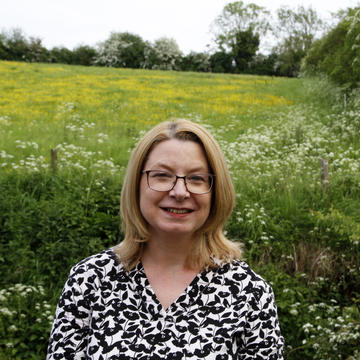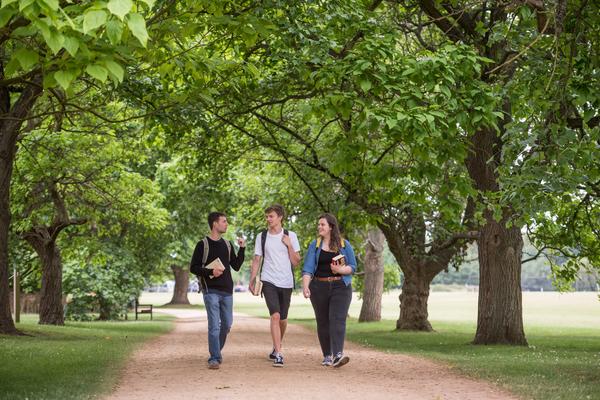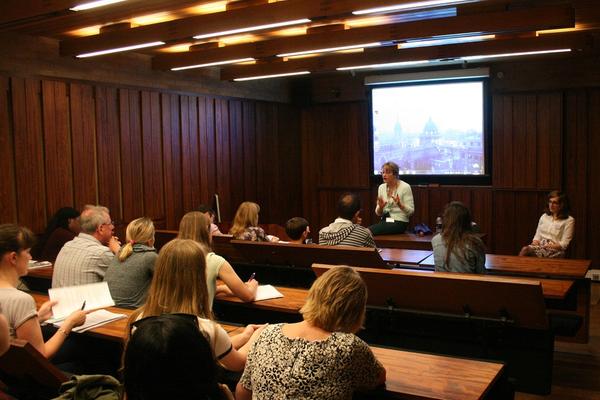Spotlight on Alumni: Carol Atherton

The book that changed my life was David Lodge’s campus novel Nice Work (1988). In it, a character called Robyn Penrose, a young lecturer in nineteenth-century English literature, muses on the millions of people who have never read Jane Eyre and Wuthering Heights. What must it be like, she thinks, to be a civilized intelligent human being, yet never to have shivered with Jane Eyre at Lowood, or throbbed in the arms of Heathcliff with Cathy? It was the summer after my GCSEs. I aspired to be a civilized, intelligent human being – I was just about to start my A levels, after all – but I’d never read Jane Eyre or Wuthering Heights. I’d actually only just worked out the difference between Jane Eyre and Jane Austen. It was time to do some work. So I took myself off to our local bookshop, spent my hard-earned babysitting money on a collection of Penguin Classics, and started to read. I hadn’t really known what I wanted to do with my life until that point, but from that moment on, I knew that I wanted to study English.
I went to a very ordinary comprehensive school in Newton-le-Willows, a small town in Merseyside where the last big thing to happen had been the rise to stardom of local lad Rick Astley. I was the first person in my family to go to university, and back in the early 1990s, it was a difficult path to tread. It was even more difficult than it might have been, as English didn’t seem to lead to any particular career. My parents would have been happier if I’d wanted to study something vocational, like law or medicine. I was extremely lucky in having a fantastically supportive English teacher, herself an Oxford graduate, who encouraged me to apply and reassured my parents that an English degree would actually lead to a worthwhile career. She took a group of us to an open day at St Edmund Hall – her old college – and as soon as I stepped into its tiny front quad, it felt like home. Other colleges felt grander and more intimidating, but Teddy Hall was somewhere I could imagine myself living.
As I explain in my book Reading Lessons, Oxford wasn’t always an easy place to be in the 90s. Unlike today, students from state schools were still in the minority. Female students from Northern comprehensives were in an even smaller minority. I didn’t struggle with the academic work, but I struggled a lot with imposter syndrome. Fellow students – privately educated, with parents and older siblings who’d been at Oxford – seemed to have the knack of navigating university life much more easily, seeing Oxford as a place to build social connections and launch a glittering career. I buried myself, instead, in learning, and in making the most of the huge privilege of being in a city where I could read every book I’d ever wanted to read.
On graduating, I trained to be an English teacher, and moved to Lincolnshire, where I’ve lived and worked ever since. I told myself that it was just for a couple of years, and that eventually I’d go back to university and do a doctorate, but life doesn’t always work out the way you think it will. When I did eventually do my PhD, in my late twenties, it was part-time, at the University of Nottingham, where I explored the complex history of English Literature as an academic discipline. In the summer of 1999, I was back in Oxford for a week as a Schoolteacher Fellow at Merton, and spent hours in Duke Humfrey’s Library at the Bodleian poring over minutes of English Faculty meetings. Combining full-time teaching with part-time PhD study was tough, but if there’s one thing an Oxford English degree teaches you, it’s how to work hard: I’d had a thorough grounding in how to manage my time.
I’ve always been fascinated by the relationships people have with books, and in particular, with the books we read when we’re young. The books we read at school act as touchstones and give us common ground with all kinds of people. Reading Lessons explores fifteen texts commonly taught in schools, the arguments that surround them and the conversations I’ve had about them over almost three decades in the classroom. I’m sometimes asked if teaching texts again and again – Macbeth, say, or Great Expectations – gets repetitive, but every group I teach experiences these texts in subtly different ways, and the times we live in change, too. Debates about ‘toxic masculinity’ cast Robert Browning’s ‘My Last Duchess’ in a completely new light, and J.B. Priestley’s An Inspector Calls certainly has a lot to say to young people growing up in an age of austerity and inequality.
I’d never have imagined, when I read Nice Work at the age of sixteen, that Jane Eyre and Wuthering Heights would change my life in the way that they did – or that I’d eventually be published by Penguin. It’s been an immense privilege to make a life in books, and Oxford played a huge part in enabling me to do it.
― Carol Atherton (St Edmund Hall, 1991-1995)
Carol Atherton grew up in Merseyside. She read English at St Edmund Hall before doing a PGCE at Manchester Metropolitan University and a PhD at the University of Nottingham. She has taught in state schools since 1996 and is currently Head of English at Spalding Grammar School in Lincolnshire. She is a Fellow of the English Association, a member of the National Association for the Teaching of English, and author of Reading Lessons (Fig Tree, 2024).






